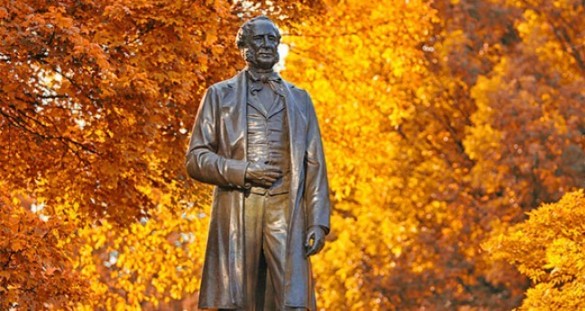 Diverse: Issues In Higher Education has ranked Vanderbilt University No. 1 in the United States for the number of doctoral degrees awarded to African Americans in the biological and biomedical sciences for 2014-15.
Diverse: Issues In Higher Education has ranked Vanderbilt University No. 1 in the United States for the number of doctoral degrees awarded to African Americans in the biological and biomedical sciences for 2014-15.
Vanderbilt also earned top 10 rankings for graduate-level degrees in the physical sciences, education and nursing.
For several years, the magazine has ranked the top 100 institutions that confer the most degrees to minority students. The 2016 report, released in early December, also includes rankings according to the total number of degrees awarded to minority students across all disciplines as well as in specific disciplines. The rankings are based on the magazine’s analysis of U.S. Department of Education reports submitted by institutions.
“This ranking is an endorsement of our university-wide efforts to recruit and support diverse students, especially in the STEM fields,” said Susan R. Wente, provost and vice chancellor for academic affairs. “[lquote]Building a diverse pipeline of Ph.D. and master’s students who will go on to mentor the next generation of students and researchers is critical to our success not only as a university, but as a nation.”[/lquote]
Wente noted that the Initiative for Maximizing Student Diversity in the School of Medicine’s Office of Biomedical Research and Training played a large role in garnering the No. 1 ranking in biological and biomedical sciences. The IMSD was established in 2000 with the goal of increasing the number of Ph.D.’s awarded to graduate students in biomedical research who are underrepresented in medicine. The program is funded by the National Institutes of Health.
“Through the leadership of Roger Chalkley, senior associate dean for BRET, and the IMSD, we adopted holistic admissions to our biomedical graduate programs nearly 10 years ago,” said Linda Sealy, director of the IMSD and associate professor of molecular physiology and biophysics, cell and developmental biology, and cancer biology. “We’ve worked hard to create an inclusive learning environment, providing mentoring and support for underrepresented students during all phases of their graduate training. We are fortunate to have multiple faculty members who have served as outstanding research mentors guiding these students, and not to be overlooked is the hard work and dedication of the students themselves.”
Students joining the Vanderbilt IMSD program typically enter the first-year Interdisciplinary Graduate Program in biomedical research, composed of 11 participating Ph.D. programs: biochemistry, biological sciences, cancer biology, cell and developmental biology, cellular and molecular pathology, chemical and physical biology, human genetics, microbiology and immunology, molecular physiology and biophysics, neurosciences, and pharmacology.
Some IMSD students also enter the first-year Quantitative and Chemical Biology Program, a smaller umbrella program that introduces elements of biology to students who wish to pursue a doctoral degree at the interface of the chemical, physical and biological sciences. The program prepares students to join any of the above departments and programs as well as chemistry and physics after completing their first year.
Vanderbilt’s biological and biomedical sciences programs were also collectively ranked 10th for the number of minority doctoral students and 12th for number of Hispanic doctoral students. The Vanderbilt IMSD program currently serves approximately 50 students in all phases of their graduate training.
In addition, the university has the Enhancing Diversity in Graduate Education program in the Graduate School. Led by Assistant Dean Don Brunson, the program has been instrumental in boosting the number of underrepresented students in Ph.D. programs by developing relationships with national consortia that support and identify talented underrepresented students, recruiting at HBCUs and minority serving institutions, and hosting diversity recruitment fairs for the IMSD and Peabody programs.
Vanderbilt was ranked No. 4 in the number of African American students earning doctorates in the physical sciences, reflecting the success of the Fisk-Vanderbilt Bridge program, which was established to increase the number of underrepresented minority students engaged in Ph.D.-level STEM research. Since its launch in the early 2000s, the program has admitted more than 100 students in astronomy, biology, chemistry, engineering, materials science and physics and awarded more than 50 master’s degrees and 25 Ph.D.’s.
In education, Vanderbilt’s Peabody College of education and human development was ranked fifth for the number of doctoral students of two or more races. The college does extensive outreach to prospective minority students, including recruiting at McNair Scholars conferences and at Historically Black Colleges and Universities; sponsoring an on-campus recruitment weekend for HBCU undergraduates and faculty; and regular participation in conferences and recruitment fairs.
The School of Nursing was ranked fourth in the number of Native American students pursing master’s degrees. The school offers scholarships targeted for minority students, mentorships with professional nurses, and 1-to-1 academic support.
To learn more about the Strategic Directions, go here.















